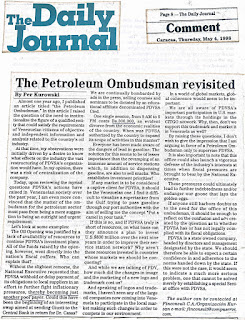Close to crying 'Yankee go Home'
I am a Venezuelan of European background and was born a few years after the end of World War II. I grew up under the influence of Audie Murphy movies and comic strips that extolled the valor and sacrifice of American soldiers in their efforts to save Europe from the clutches of fascism. As an adolescent, although against the Vietnam War, my little piece of American heart prevented me from participating in public protests outside the US Embassy, and even more so from flag burning.
However as I am nearing my fiftieth birthday, I suddenly have an incredible urge to yell “Yankee Go Home”. This occurred most recently when I read another of Rowan's articles, in this case blasting away at the latest changes implemented at PDVSA.
Theoretically, had we successfully arrived at the end of the opening of the oil industry, the recent cuts in production, which have had such positive effects over the last few months, would have been impossible to execute since the private sector would have to be compensated. The oil opening per se implied a departure, albeit clandestine, from OPEC. Since I have never been convinced that OPEC was losing relevance, I publicly opposed this oil opening policy, asking that its implications be democratically discussed.
I also considered that the Venezuelan oil industry benefited from being divided into several different entities. Even though this evidently represented additional costs, it was a good way of achieving mutual and cross supervision by experts in the industry.
Therefore, when we were sold a restructuring based on supposed and overestimated savings (an annual figure of US$ 2 billion was brazenly bandied about) and which simply implied a total centralization of power, I loudly cried foul.
We were told that due to the lack of internal resources it was necessary to invite foreign capital to participate in the development of basic activities such as exploration and production.
Soon after, as if by magic, resources suddenly appeared tand were quickly invested in the “strategic” but very poorly explained building of gasoline stations that could also sell fast food. I felt misled and publicly informed PDVSA that the risk of Kuwait building a gas station in Las Mercedes in Caracas in order to compete directly and sell its ultra-light gasoline to the local market was really very slight.
I also protested, and continue to do so, when PDVSA, in the face of an upward trend in outsourcing of services, created the CIED in order to sell seminars and courses to captive clients. I protested and continue to protest when PDVSA, without much explanation, used an inmense amount of resources to finance studies of commercial ports in rivers in the eastern part of the country, for example.
The President of PDVSA should occupy his post as if he were a soldier on a battlefield on a sacred national mission. It wrenched my soul to see how he thinks he is a General Patton instead, and finds his way onto an entire page of the Wall Street Journal as Executive of the Year. Perhaps it should have been Entrepreneur of the Year.
Three years ago, as I traveled in the interior of the country, I observed how high interest rates, new taxes and a foreign exchange policy that in real terms strongly revalued the national currency were taking the country on a wild ride towards recession.
At that point, while expressing my anguish at the possibility of a permanent loss of jobs, the then President of PDVSA, as if he were any common politician on TV, happily informed whoever would listen, that Venezuela was "condemned to success”. I almost cried with rage.
Last week, Rowan wrote that PDVSA’s ex-President, Luis Giusti, had produced a bonus of US$ 2.3 billion for the state with the oil opening - as if this were not simply the fruit of oil income perceived in advance, unfortunately already frittered away.
Rowan wrote: “Giusti’s strategy was brilliant. From a national perspective, Giusti was a patriot”. With respect to the recent changes at PDVSA, he wrote: “The development of this country has just been set back twenty years. The only institution in active transition to modernization, professionalism and meritocracy in Venezuela has been sacked. It’s been vandalized, ruined by ideologues from a Dark Age”.
I recently registered a NGO called Petropolitan, and through it I am fighting against the taxes on oil products imposed by a majority of the oil consuming countries of the world. These charges prevent oil-producing countries from receiving what they should rightly be receiving from the sale of their non-renewable resources.
The real value of an item of goods is normally measured at the consumer level, and in this sense the average value of a barrel of oil in the world might have already surpassed US$ 100. Of that value, up to a few months ago, the producer only received US$ 10, and today still has to settle for a meager US$ 20. I hope that someday when the absurd confiscation by taxmen in the developed world is eliminated, they will receive, say US$ 40 or more. If this defense of what is rightly ours classifies me in Rowan’s world as being one of the ideologues of the Dark Ages, then that is exactly what I am, and am proud of being so.
Daily Journal, Caracas, September 24, 1999






